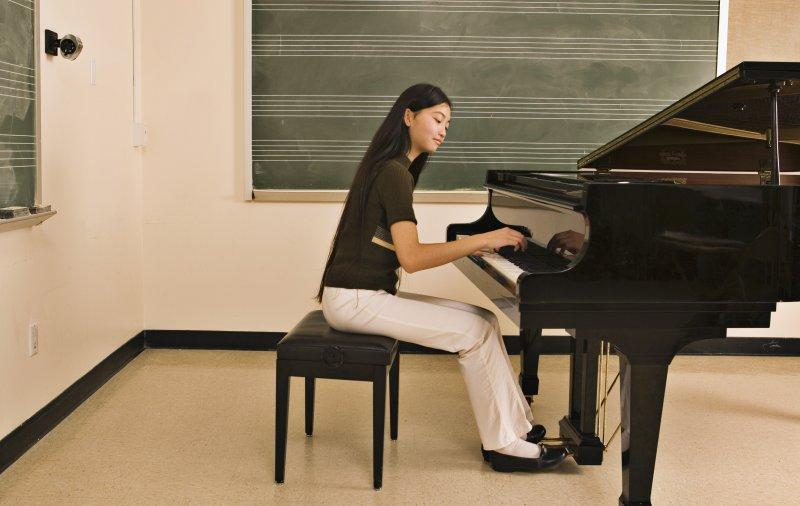Let’s face it, even the most experienced pianists make mistakes. Below, piano teacher Julie P. shares the 5 most common piano technique mistakes that both beginner and experienced pianists often make…
Your piano technique is everything when it comes to playing the instrument. Whether you’re a beginner or an experienced player, there are probably some mistakes you’re making that are holding you back.
In this blog post, we’ll take a look at five of the most common piano technique mistakes and how to fix them.
So let’s get started with our list of the most common piano technique mistakes!
Why Do I Always Make Mistakes When I Play the Piano?
The most common piano technique mistakes are:
- Playing with flat fingers
- Sitting too close to the piano
- Keeping your wrists too low
- Not using your arm weight
- Not establishing efficient fingerings
The best way to avoid these piano technique mistakes is to work with a piano instructor who will show you the ropes. Sign up for piano lessons today and check out this video to get a better idea of what you’ll learn in your lessons:https://www.youtube.com/watch?v=2wQ1ZXph1HI
5 Most Common Piano Technique Mistakes
As a piano player, you’re always looking for easy ways to improve your playing. While there are no fast-tracks to becoming a great piano player, there are simple things you can do to improve your skills.
In fact, you’re probably making some simple piano technique mistakes that are holding you back from reaching your full potential.
Below are the five most common piano technique mistakes. If you work on fixing these mistakes not only will you improve your piano techniques, but you’ll also open up your ability to make greater improvements in the future.
1. Flat fingers
Many students play with flat or collapsed fingers when they’re first learning the piano. This means that either their finger is extending from their hand in a flat manner and/or their first knuckle is collapsing.
Flat and collapsed fingers slow down finger technique and usually cause tension. Play with your fingers in a curved position, as shown in the video below.
2. Sitting too close to the piano
If you sit too close to the piano, your arms won’t have enough room to extend in front of you. This limits the range of motion for your arms, which causes your wrists to contort in an effort to reach the right notes.
Sit on the edge of the piano bench and move it back until your elbows are extended slightly forward from your shoulders. Check out the video below for some additional tips.
3. Wrists too low
Your wrists should extend straight from your arms and shouldn’t collapse down. If your palms get close to the front of the piano, your wrists will likely collapse.
Wrists that are too low cause tension and strain in your arms and fingers, and also reduce the speed at which you can play.
If your wrists are low, your fingers are probably also collapsing, as discussed above. The picture below shows the right and wrong way to hold your wrists.
4. Not using your arm weight
The points mentioned above about arm position are important because we want to use the weight of our arms and torso when playing the piano.
Even though our fingers control the piano keys, students who push down the keys with only the strength of their fingers will not produce a very good tone.
Channeling our arm and body weight efficiently through our arms allows you to produce a wide range of sounds and tone colors. It also reduces the strain on your fingers.
5. Not establishing efficient fingerings
One of the best ways to learn a song quickly and reliably is to decide ahead of time the best fingering pattern.
Students who play with random fingerings that change every time they practice often get into a fingering jam, or have to search for the key they want.
If you know which fingers are playing which notes, and use the same fingerings every time you practice, you’ll know the song more securely and won’t be searching for the keys anymore.
Exercises to Improve Piano Technique
Here are some beginner piano technique exercises you can use to hone your craft.
One effective exercise is to play scales in both directions, starting with the tonic note and moving up the scale to the octave, and then starting with the octave and moving down to the tonic. This exercise helps to develop evenness of touch and a smoothness of movement.
Another useful exercise is to play broken chords, starting with the root note and then moving up through the chord tones. This helps to develop coordination between the hands and a greater range of motion.
Finally, arpeggios are also a great way to improve technique. By playing the notes of a chord in succession, arpeggios help to develop a clear tone and a sense of rhythm.
By practicing these exercises on a regular basis, it is possible to significantly improve piano technique.
How Do You Avoid Piano Mistakes?
As any pianist knows, mistakes are an inevitable part of playing the instrument. Even the most skilled musicians can occasionally hit a wrong note or lose their place in the music.
However, there are some steps that you can take to help avoid piano mistakes. One of the most important things is to practice regularly.
By taking the time to master the pieces you will be playing, you can help to ensure that you will make fewer mistakes when it comes time to perform.
In addition, it is important to stay focused when you are playing. If you are feeling tired or distracted, it can be more difficult to concentrate on the music and make sure that you are hitting the right notes. By remaining focused and practicing regularly, you can help to reduce the number of piano mistakes that you make.
Is There a Wrong Way to Learn Piano?
There are many different ways to learn piano, and there is no one right method that works for everyone.
Some people learn best by taking formal lessons from a teacher, while others prefer to teach themselves using books or online resources. Some people progress quickly and easily, while others find the learning process to be more challenging.
No matter what approach you take, the important thing is to keep practicing and progressing at your own pace.
There is no wrong way to learn piano, as long as you are enjoying the process and making progress. Everyone learns differently, so finding a method that works for you is the most important thing. If you stick with it, you will eventually become a skilled pianist!
Do Professional Pianists Make Mistakes?
Any pianist worth their salt knows that practice makes perfect. All the hours spent playing scales and fingering exercises pay off when it comes time to perform on stage. But even the most experienced professional can make a mistake during a live performance. It’s simply inevitable.
The human mind is capable of so much, but it’s not perfect. So when a mistake does happen, how do professional pianists react?
Some might get flustered and lose their place in the music. Others might play on through the mistake and hope that the audience doesn’t notice. And still others might stop playing altogether and start over from the beginning.
But ultimately, mistakes are part of being a musician. What matters is how you recover from them.
Do you let them throw you off your game, or do you power through and finish the piece with grace and poise? Showing your resilience in the face of adversity is what separates the true professionals from the amateurs.
So next time you make a mistake, just remember: it’s all part of the journey.
Piano Technique – More Important Than You Think!
Many people think that piano technique is not important, or that it is only a small part of playing the piano. However, piano technique is actually very important, and it can make a big difference in your playing.
Good technique will help you to play more smoothly and evenly, and it will also help you to avoid injuries.
In addition, good technique can help you to produce a more beautiful sound. Therefore, if you want to improve your piano playing, make sure to work on your technique. With a little practice, you can develop good technique and improve your playing significantly.
If you can correct these five piano technique mistakes, you’ll be a much better piano player. Your piano teacher can also help you correct these mistakes as well as any other technique issues you may have in your playing.
 Post Author: Julie P.
Post Author: Julie P.Julie P. teaches flute, clarinet, music theory, and saxophone lessons in Brooklyn, NY. She received her Bachelor’s degree in Music Education from Ithaca College and her Masters in Music Performance from New Jersey City University. Learn more about Julie here!
Suzy S.

